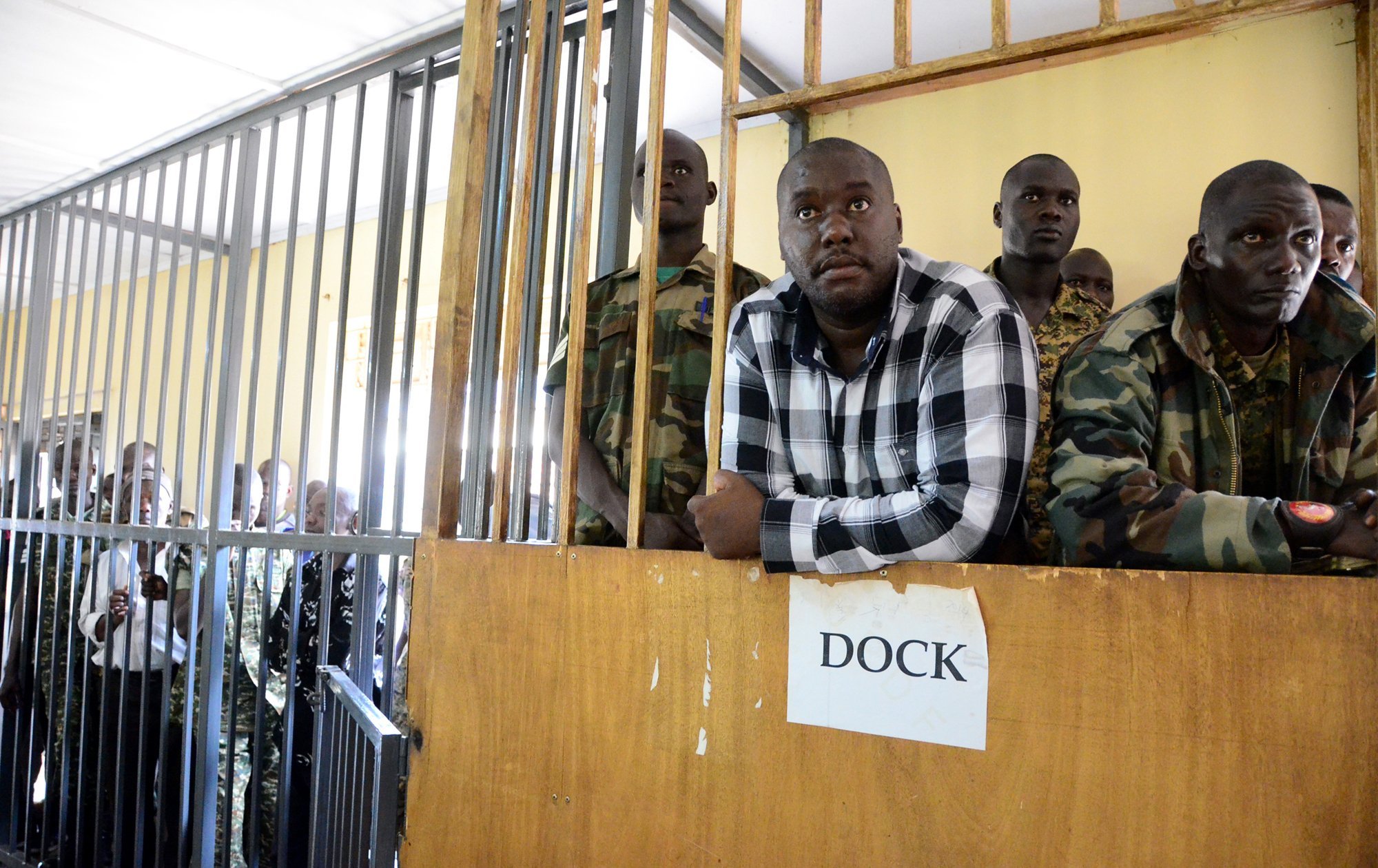Prime
Why Kabaziguruka trial by army was declared a nullity

Former Nakawa Division Member of Parliament Michael Kabaziguruka (centre) appears before the General Court Martial on October 17, 2016. PHOTO/MICHAEL KAKUMIRIZI
What you need to know:
- The majority decision also made important consequential orders that will lead to justice or liberty of people being wrongly tried by courts martial.
By Eron Kiiza
Former Supreme Court Justice Joseph Mulenga is departed, but through his judicial wisdom immortalised in vide – Attorney General vs Uganda Law Society (Constitutional Appeal-2006/1) [2009] UGSC 2 (January 20, 2009); loomed large in last week’s Constitutional Court decision clarifying the role and scope of military courts and clarifying the meaning of not only service offences but also the persons subject to military law.
Such questions have littered Uganda’s legal compounds for years, but this so far is the most progressive and the clearest judicial decision on the matter.
Former FDC MP Micheal Kabaziguruka had run to the Constitutional Court after military authorities arraigned him before the General Court Martial for allegedly aiding soldiers to commit crime without naming the soldiers he allegedly aided.
Mr Kabaziguruka’s argument was that as a civilian, he should never be arraigned before a military court since army courts lack the competence, independence and impartiality to try civilians. He argued that such courts cannot secure the constitutionally guaranteed fair trial.
The Constitutional Court substantially agreed with Mr Kabaziguruka and declared his military trial unconstitutional, a nullity and referred to the High Court the assessment of damages/money that Mr Kabaziguruka is entitled to for suffering such a human rights-violating and unconstitutional trial. Here is why.
Military courts are partial, lack independence and are not competent to try civilians because they lack security of tenure and can be fired or appointed at the pleasure of the Military High Command. Military courts are also composed of soldiers who are not necessarily lawyers trained to handle complex legal issues. Moreover, military courts are part of the Executive and not the Judiciary, and prosecutions in courts martial are not superintended by the independent office of Director of Public Prosecutions (DPP), who is obliged to avoid abuse of legal process, take into account public interest and the interests of the administration of justice.
The Constitutional Court compared the oaths taken by civilian judicial officers and members of military courts and found a stark difference. The former swear to protect the Constitution, but the latter swear to uphold the Uganda Peoples Defence Forces Act that creates the Military High Command and other organs of the UPDF. Courts martial are simply not independent of the High Command the way members of the Judiciary are independent of the Executive.
The purpose of the Uganda Peoples Defence Forces (UPDF), Act 2005, the Constitutional Court explained, is to regulate the Defence forces’ discipline and operations as opposed to governing matters of civilian citizens. That is why the Constitutional Court proceeded to declare Section 2 of the UPDF Act invalid to the extent its definition of service offence covered crimes under the Penal Code and other laws. The court also struck down Sections of the UPDF Act which enlarged the definition of persons subject to military to cover people who are found in possession of items considered the ordinary monopoly of the military.
The court, by a majority, remained shy of rescuing people who allegedly aid military people in committing service offences. Each judge had a reason for their decision but one peculiar justification on this point that I find problematic was the use of the common law doctrine of voluntary assumption of risk as a basis for trying civilians who aid soldiers in committing service offences before the courts martial.
Voluntary assumption of risk is demonstrably inferior to constitutional provisions. It cannot be used by courts to sanction illegality. Constitutional law is superior to tort law. You cannot lean on defences in tort law to attack clear constitutional guarantees. Inherent in voluntary assumption is consent and consent cannot waive constitutional provisions. In a democracy, one cannot consent to violation of his/her her rights. Much less to non-derogable rights like fair hearing.
The majority justices noted that Sections 119(1)(h) and 179(1)(a) of the UPDF Act are unconstitutional and had the practical effect of unconstitutionally rendering every civilian in Uganda subject to the jurisdiction of military courts. Article 210 of the Constitution restricts military courts to disciplining only members of UPDF. Military courts can only try service offences specified under the UPDF Act, only regarding persons subject to military law. Such people are soldiers and those who aid them in committing service offences. The majority decision found the petitioner not subject to military law.
The majority decision also made important consequential orders that will lead to justice or liberty of people being wrongly tried by courts martial. Their cases are to be transferred to civil courts for the DPP’s management with 14 days of the judgment. The civil courts will retry or otherwise direct on those already serving unconstitutional sentences by courts martial.
The Constitutional Court has delineated the legal confines of military justice. It is not the end of the road though. The Supreme Court will have the final say. True to their record, the military and Executive will try to circumvent this judgment and continue to use military trials to settle political points with the Opposition.
Mr Kiiza is a human rights lawyer




